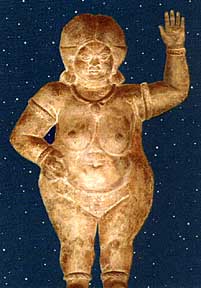
This image in the Cairo museum dates from late antiquity, when Egypt still exerted a powerful religious influence across the Roman empire. She exemplifies a standard of beauty that has been nearly eclipsed in modern society: one that appreciated fat women.
Mother of the All
In the last days of ancient Egyptian religion, veneration of Auset (Isis) mixed with Judaic, Hellenistic, and Gnostic influences under the Roman empire.
Khokhmah, the Jewish personification of Wisdom, came to be revered under the Greek name Sophia, or as Arche, "the Beginning of the power which is over every power, she who is without beginning." She was also called Pronoia: "the Primal Thought that dwells in the Light... she who exists before the All."
Egyptian gnostics revered this Mother of the All as Barbelo, "the all-wise Sophia," cause of Life and Mind. Her litanies, such as Thunder, Perfect Mind, drew on the old praisesongs of Auset. Fragmentary invocations even found their way into the Gospel of Thomas: "Come, Lady revealing hidden secrets..."